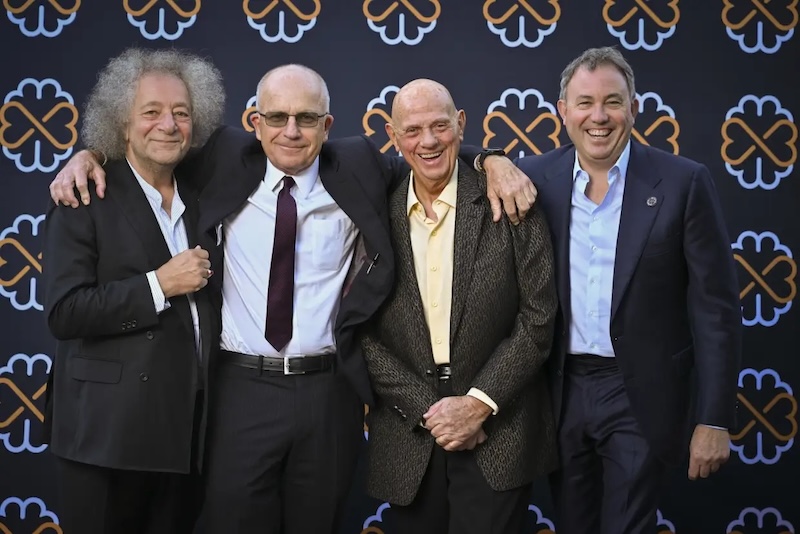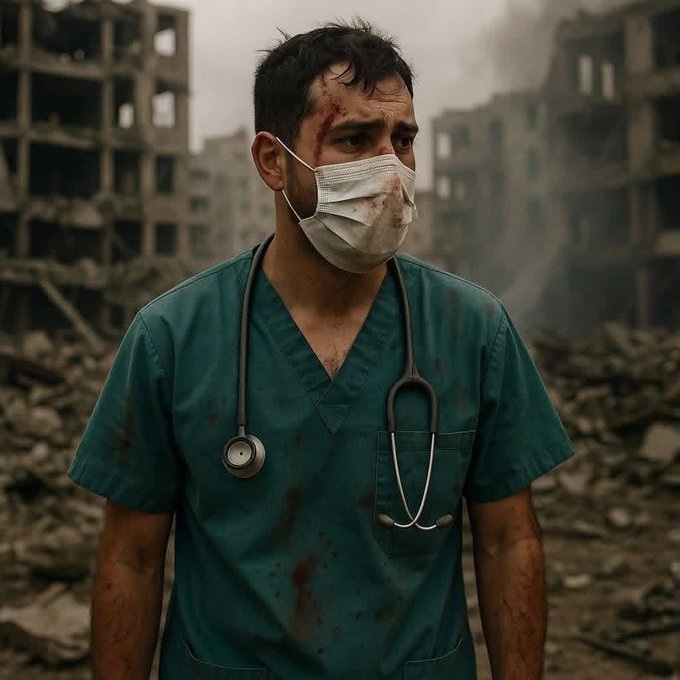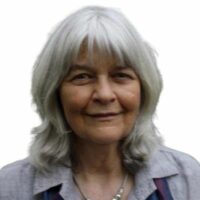Hearts & Minds Investments (HMI), which tips in some of its profits to medical research, also invests in companies with links to Israel’s human rights violations in Gaza. Wendy Bacon and Cathy Peters report on Australia’s ‘hedge fund royalty’.
The movers and shakers of Australia’s hedge fund world are on board: Caledonia, Magellan, Ellerston, Paradice, and Regal Investments. Corporate raiders too: Garry Weiss and Geoff Wilson; and investment banking bigwigs Chris Cuffe and Barrenjoey Partners’ Matthew Grounds and Guy Fowler.
It’s ‘media partners’ are Australia’s corporate media duopoly Rupert Murdoch’s News Corp and Nine Entertainment. Its profits are impressive; investment returns exceeding 12% since inception, income shooting up from $58m to $83m last year alone.
And it profits from war, even from the ‘weapons testing lab’ which is Israel’s genocide in Gaza.
Hearts & Minds Investments was established to secure philanthropic donations for medical charities and is particularly close to the Victor Chang Cardiac Research Institute. HMI invests in “high conviction” corporate situations globally, and also via its SOHN Hearts and Minds Conference. A major investor is Sabra Capital, the New York hedge fund run by Boaz Weinstein.
So HMI is not wanting for a stock tip, or for market insight. Over the years Sohn has hosted ‘investment luminaries’ such as e Ray Dalio, Charlie Munger, Dan Loeb, Cathie Wood and Bill Ackman.
Two companies recommended to investors by fund managers at the Sohn Conference in November 2024 were Airbus and Transdigm. Both companies supply parts for weapons that have been used by Israel to bomb Gaza.
Airbus has a long-established partnership with Israel’s largest weapons company, Israeli Aerospace Industries. It also owns 37% of weapons company MBDA, which manufactures the wings for GBU-39 glide bombs, while US-based aerospace and defence company TransDigm manufactures parts for the Apache helicopter, F-16 and F-35 aircraft.
All are weapons that the IDF uses to bomb civilians in Gaza.
Lost hearts, closed minds. Medical research show ignores plight of Gaza, amplifies Israel
This year’s conference selection includes Heidelberg Materials, which has been involved in illegal settlements in the West Bank for many years. In September this year, it was added to the OHCHR UN database of companies profiting from settlements, along with its subsidiary, Hanson Israel.
HMI has promoted these companies to investors attending Hearts and Minds conferences and through coverage by media partners (AFR, SMH and The Australian) of what the SMH described as the “investment charity olympics”.
The conferences are part of Hearts and Minds Investments (HMI), which was listed on the ASX in 2018.
Hearts and Minds Investments
HMI was the brainchild of two long-time directors of the Victor Chang Cardiac Research Institute (VCCRI), Chairperson Matthew Grounds and corporate raider Gary Weiss. Their aim was to raise funds for VCCRI and other medical research organisations by creating a company that would invest in ten companies recommended by fund managers at the annual conference for one year and twenty others chosen by top fund managers for longer periods.
The other major player who helped establish HMI was Guy Fowler. Grounds and Fowler are Co-Executive Chairs of Barrenjoey Partners. At the time when they set up HMI, they both worked at UBS Investment Bank. This bank is a long-term investor in Israeli arms manufacturer Elbit Systems, which supplies most of the weapons used by the IDF.
According to the HMI prospectus, the $7.5m cost of establishing HMI was covered by VCCRI, which was paid back with interest. There is also an agreement that 40% of the funds raised will go to VCCRI for 25 years.
MWM’s interest in VCCRI was sparked by its attack on top cardiologist Peter Macdonald, who It excluded from working in his VCCRI laboratory for 10 weeks after he made a brief sceptical comment about Israel’s intelligence agency Mossad at a community forum.
Heartless. Victor Chang Cardiac Institute and the Israel lobby
HMI is successful in financial terms, delivering large dividends to its investors, which include Grounds, Weiss, Fowler and other associates.
Each year, 1.6% of HMI’s net assets are donated to medical research. These donations are partly funded by HMI’s chosen fund managers and directors volunteering their services.
Pushing ethical boundaries
HMI supports valuable medical research. Organisations and medical research projects that have benefited from HMI in one or more years are listed here. In the 2024/5 financial year, HMI donated $9.4m to medical research organisations, of which VCCRI got $4,501,788.
However, while HMI is celebrated by its supporters as a unique philanthropic initiative, serious ethical and accountability questions arise when health research organisations receive funds from investments in companies that could,
arguably be found to be complicit in war crimes, including, in this case, genocide.
Recently, there has been an increasing emphasis on ‘responsible conduct’ and accountability in the business sector. International guidelines have been produced for investors. Locally, superannuation fund giants Australian Ethical, Hesta and Vision Super have cut ties with Israel after BDS campaigns.
UN Rapporteur Francesca Albanese focused on the role of the private sector in her 2025 report to the UN Human Rights Council, “From Economy of Occupation to Economy of Genocide”. She documented how corporations profit from Israel’s economy of illegal occupation, apartheid and genocide.
Albanese called for the international community to “hold the private sector accountable” for complicity in Israel’s abuses, by ensuring they face consequences for their involvement in violations of international law. In this, Albanese is supported by Australian lawyer and UN Special Commission of Inquiry member, Chris Sidoti.
Like nearly all public investment companies, HMI has an Environmental Sustainability and Governance policy. This policy includes adhering to UN human rights goals and consideration of climate change and pollution. It commits HMI to taking an “active interest in the ESG practices of companies in which it invests, and seeks to exert influence on their governance, policies, practices”.
There are investment exclusions which cover companies involved in tobacco, cluster bombs and other controversial weapons, old-growth forests, gambling investments and companies involved in exploiting fossil fuel reserves, but more broadly, the policy supports “integrating consideration of ESG issues into its investment strategy”.
Advent International
Global private equity giant Advent International was selected to present an investment choice at the Hearts and Minds conference in both 2024 and 2025.
In 2024, Advent manager and aerospace expert Jordan Katz selected TransDigm, one of the world’s biggest arms manufacturers. Hearts and Minds invested $22.8m in TransDigm in 2025.
TransDigm subsidiaries supply parts for the AH-64 Apache helicopter, the F-16 Fighting Falcon and the F-35, aircraft that have dropped 2,000-pound bombs on civilians in residential buildings and healthcare facilities in Gaza. In January 2024, TransDigm shares had risen by 32% compared to before Israel’s war on Gaza began.
In December 2023, Jewish Voice for Peace and the Palestine Action Group protested in Cleveland against TransDigm. They called on TransDigm to stop “this manufacturing of genocide [that] is occurring in the heart of our own city .… we say no to weapons manufacturers in our city.”
TransDigm has been repeatedly reported for price gouging on its US Department of Defence contracts. In 2019 and 2021, Pentagon Inspector General reviews found that TransDigm overcharged by $37m with mark-ups as high as 4,450%.
Heidelberg Materials
This year, Advent’s Boston-based CEO, Mohammed Anjarwala, chose the world’s largest cement company, Heidelberg Materials. Heidelberg owns Australia’s biggest cement producer, Hanson Australia, now rebranded as Heidelberg. Heidelberg has a long history of involvement in illegal settlements in the West Bank.
Large pension funds in Denmark and Sweden have disinvested from Heidelberg. Three weeks before HMI nominated Heidelberg, several big Dutch pension funds were reported to have also divested.
In 2007, Heidelberg bought Hanson Israel, which owned concrete plants in the illegal settlements of Modi’in Illit and Atarot Industrial zones, and the Nahal Raba complex, which included an asphalt plant and aggregates quarry. The plant has been closed since November 2023, but is still owned by Heidelberg Materials and occupies confiscated Palestinian lands belonging to the villages of Al-Zawiya and Rafat.
In September this year, the UN Human Rights Council list added Hanson Israel and Heidelberg Materials to its list of companies contributing to development and profiting from their businesses in the illegal Israeli settlements in the West Bank. Heidelberg Materials has objected to its UN listing, saying that it closed the Nahal Raba complex.
There’s no evidence that Heidelberg has offered any compensation to Palestinians.
Heidelberg has planned to sell the quarry since 2019. However, in May this year, an expansion plan for the quarry was approved despite the complex being shut and strong objections from Palestinians.
This record of profiting from illegal settlements is not the only reason why Heidelberg Materials is an inappropriate choice for a company supporting medical research. HMI claims in its ESG policy to be concerned about climate risks and environmental pollution.
Cement production is the largest source of industrial carbon pollution globally, generating about 8% of annual greenhouse gas emissions. The Climate Accountability Institute found Heidelberg Materials is responsible for at least 0.12% of global emissions since 1965. Pakistani farmers have recently begun legal action against Heidelberg for climate-linked damage.
Airbus
Airbus has a well-established partnership with Israel Aerospace Industries to supply and manage its Heron TP attack and surveillance drones. The Israeli military has used these drones in hundreds of air strikes and bombings of Gaza and Lebanon. The Heron drone can carry bombs weighing 1,000 kg.
HMI’s $27m investment in Airbus was one of its most profitable selections at last year’s conference.
Airbus also owns 37% of MBDA, which manufactures the wings for GBU-39 glide bombs and other weapons used by the IDF in Gaza. MBDA contributed more than $100m to Airbus’s profits in 2024.
MBDA’s Alabama factory makes components for Boeing’s GBU-39 bombs used to kill civilians in Gaza. Its profits flow through Stevenage to Paris — and it is one of the British government’s favourite firms, reveals SOLOMON HUGHEShttps://t.co/HCbubHXXIR
— Morning Star (@M_Star_Online) August 22, 2025
In July 2025, a joint investigation by the Guardian, Disclose and Follow the Money examined the supply chain behind thousands of GBU-39 bombs used in Gaza. It identified 24 cases where a GBU-39 was used to kill 500 civilians, including children. Many of these attacks took place without warning
in schools and camps where displaced families were sheltering.
Microsoft
Top of HMI’s longer term investments in 2024 was Microsoft with $47m. The BDS movement lists Microsoft as the ‘most complicit tech company in Israel’s illegal apartheid regime and ongoing genocide, partly because it
allows Israeli intelligence access to its services for mass surveillance.
Despite these findings and protests within Microsoft, it remains in HMI’s portfolio.
Fossil fuels investment
HMI’s ESG policy excludes fossil fuel companies. Yet the world’s biggest oil services company, SLB (previously Schlumberger), was chosen at this year’s conference. This year, SLB has been awarded major drilling contracts in partnership with Shell and Exxon-Mobil.
All of the information in this story can be found on the public record. MWM sent questions to HMI’s Chair, Chris Cuffe, asking whether HMI was aware of its investments in companies involved in weapons, illegal settlements and fossil fuels and if so, why they decided to invest. We have not received a response.
MWM has exposed Australia’s superannuation funds for their indexed investments associated with war crimes. HMI shows Australia’s hedge funds are in the same space … with “high conviction”.
Australian super funds in showdown for Israel war crimes investments as member meetings loom



